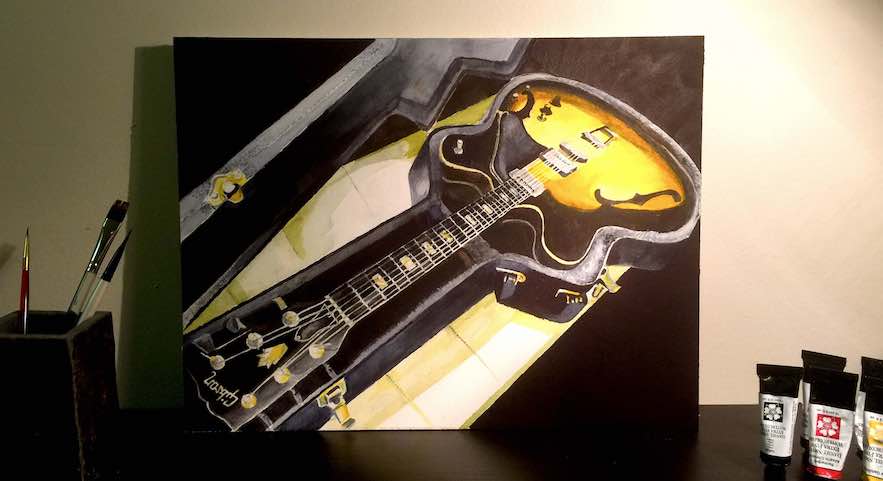Does the overall artistic atmosphere of a country or locale improve with government funding? What do you feel about the funding of education in general for skills like writing, language, music, or artwork? Let’s dive in!
I wrote the following in response to an email I received, urging people to contact their Senators and support the passage of a bill that would allocate an additional $15 Million to both the National Endowment for the Arts (NEA) and the National Endowment for the Humanities (NEH). Being an English major, an avid musician, and an amateur artist, you might think I would support this idea. Here’s what I wrote to my senators…
Senator Reid and Senator Ensign,
I just received an email indicating the House approved a $15 Million increase for both the NEA and the NEH.
Throwing money at a problem rarely fixes it – and we’ve thrown money at our economy in magnitudes of such scale that most Americans are desensitized to large money anymore. Thus, $15 Million may sound puny in comparison to what’s already been spent to bail out banks, car companies, and buy up bad debt. However, it is still a very large amount of money and must come from our pockets, either in the form of new taxes or through devaluing the money that we already possess. But in truth, the amount of money is really less of an issue than its effectiveness as a solution.
But how does a society encourage itself to appreciate art; to value something aesthetic that is currently not widely appreciated?
Art is extremely important, but it doesn’t need government support (especially in the form of money – the false panacea) to survive. Quite the opposite in fact. Art needs a strong educational system that promotes the value of art within our culture, an educational system that teaches children and adults the importance of responsibility, sacrifice, love, and the fleeting, impermanent nature of our lives. Great art communicates these aspects of our experience. And the wonderful thing about the teaching of these truths is that it doesn’t require extra funding – just dedicated teachers who have been empowered with the ability to run a successful classroom.
Problems are rarely solved with money. Please don’t think that $15 Million to the NEA and NEH will do much to increase art appreciation in our society. Instead, we must present our children opportunities to endure and triumph in their daily lives, creating experiences which will allow true art to resonate within them personally. And while this task will take concerted effort and a rethinking of our educational model, it will ultimately lead to a greater society in which art, and the appreciation thereof, is sustainable.
~Chuck
Please take the time to let me know what you think on this issue – because I believe that while we may disagree, we’re ultimately after the same thing.
UPDATE: I’m now a full-time recording artist out of Nashville, TN (Cecil Charles). I’m supporting myself (and releasing one, studio quality song per month for 2019 and, well, as far into the future as I can see), by generous listeners and readers like you.
It’s melodic pop, full and rich and filled with harmonies and layers of sound. Sometimes folky, sometimes funky, and I think you might enjoy. Listen below!
Then check out my Patreon page – a simple $5 pledge gets you free downloads of each monthly song, as well as exclusive content (song ideas I’m working on, updates on shows, news from traveling, and more). It allows me to take you along on this journey I’m on, as a full-time recording artist and essayist. Every little bit helps, so thank you in advance for your consideration!



http://www.nea.gov/news/news09/2010-nea-budget-request.html
As you know Chuck, I am always prone to disagreeing with you on these issues. I love to disagree with you, because unlike many others that I talk to, you are able to argue your side cogently and persuasively.
From my quick research, I see that the 15 million you are referring to represents a 4% or so budget increase for 2010, and increase that is about matched by the 2008 and 2009 increases. You have termed this “throwing money at a problem” without any clear reference to what the “problem” is and why a budget increase qualifies as “throwing money.” Your fiscally conservative nature is respected by me, no debate there, but I challenge you to look at the list or programs, education and other, and apply your free market ideal to them. http://www.nea.gov/national/index.html
You say,
“Art needs a strong educational system that promotes the value of art within our culture, an educational system that teaches children and adults the importance of responsibility, sacrifice, love, and the fleeting, impermanent nature of our lives.”
Is that not what the NEA attempts to provide? How do you propose that programs to educate and excite people, young and old, in the arts would be funded? Is there some private model I am missing? Perhaps a business that educates young people? Would not such private enterprise, be a contractor to the public education system and hence be a publicly funded system?
Further, I challenge you on the use of the term “responsibility.” I have heard this term before, and we have discussed its codeword nature before. This code word meaning, I don’t want to pay for you, your kids, or your problems. I’m not sure if the arts are about responsibility or not, I dare say not, but the injection of the term responsibility is out of place here.
The arts and humanities are a very important cultural element, one that connects us to the humanity of past civilizations, pushes us forward as a society, and helps us to explore the human condition. I say this not because I think you don’t know that; I think you know it better than most, but again, I challenge you to explore the alternative.
Noah – first of all, thank you for taking the time to eloquently state your opinion – it really means a lot to me to hear from you. In fact, one of the main reasons I started blogging was to host a forum where I could talk to you and other friends and family about issues that either a) kill a party, or b) keep us up too late to go to work the next day!
That aside, there are a number of issues here that deserve to be debated:
Firstly, while past budget increases do set a precedent, they don’t, out of hand, justify a current increase in budget. Nor has the NEA always been successful in their lobby for more money – the early 80’s and mid 90’s showed minor and major decreases in funding respectively. Ultimately I’m not arguing to cut funding to the NEA or NEH.
Secondly, I haven’t found any information on The NEA website specifying the ways in which the money will be divided, nor the criteria by which the division of money between their various departments and programs will be decided. I, personally, am always suspicious of bureaucracies and their abilities to spend taxpayer money with the fiscal responsibility of a private enterprise. When organizations are appropriated money that they must spend or risk losing said funds the following year, a wasteful system evolves. It’s very “in” right now to highly criticize the ways in which private companies spend government bailouts (I myself don’t agree with the bailouts in concept at all), but I think the same degree of particularity should be applied to current government programs and their spending decisions, whether they’re asking for money or not.
As for “the problem”, the About Us page of the National Endowment for the Arts describes the organization as follows:
“a public agency dedicated to supporting excellence in the arts, both new and established; bringing the arts to all Americans; and providing leadership in arts education. Established by Congress in 1965 as an independent agency of the federal government, the Endowment is the nation’s largest annual funder of the arts, bringing great art to all 50 states, including rural areas, inner cities, and military bases.”
Thus I would suggest that if the NEA is lobbying for more money (they’ve been successful since 2000) – they must feel that they are consistently not performing to the standards that their above stated duties require. Furthermore, they seem to believe that consistent increases in their funding will make them better able to achieve their goals.
Here is where “throwing money at a problem” seems wasteful, especially considering our current economic downturn. As Nevada’s governmental organizations fight left and right to justify their worth so as not to lose funding, the NEA asks for more. Last I checked our national debt is over $11 trillion dollars and our payroll is falling faster than our government expected. Why build on that?
According to the Chariman Patrice Walker Powell, the current funding increase “will enable the Arts Endowment to bring high-quality arts and arts education programs to areas throughout the United States.” I did examine the individual programs as you suggested, and I truly believe the goals they are striving for could be accomplished in our public school and university systems without any extra major use of funds. “Poetry Out Loud” for example, “encourages high school students to memorize and perform great poems.” Our local school systems could increase poetry awareness simply and effectively without extra government funding – just create a system that values and rewards poetry knowledge (and other art forms) in the classroom and in the school systems.
Now I used the words “simply” and “effectively”, not necessarily easily. But people can accomplish what they set their minds to. There are volunteer poetry readings at the public libraries in Rogers, Arkansas of all places, and my greatest poetry experience came from Doc White, my Naval Academy Shakespeare professor who, without any extra use of funds, communicated his passion and knowledge of Shakespeare in such a way it was hard not to be inspired.
Finally, don’t be so quick to define responsibility for me. We live in a country that has sent inconsistent messages to its people about their responsibility to, as you put it, “pay for you, your kids, or your problems.” The libertarian ideal of personal property suggests one has no responsibility to pay for anything that one doesn’t choose to pay for (nor can one forcefully take money from anyone else) – but again, we live in a country that has an inconsistent history in this respect. Thus any argument in this matter based on precedent would be difficult for either of us.
However, in the case of this argument on art, responsibility signifies being honest and accountable for the consequences of one’s actions, believing that one has ultimate control over their reactions to the events of life, and respecting the fact that personal and public resources have limits. Responsibility is not at all separate from great art – great artists have a responsibility to tell the truth, and the most lasting art has often come from nations and cultures where the people’s voice was forcefully being silenced, (if you haven’t read The Gulag Archipelago, I highly recommend it.) All this to say, in the great scheme of things, art doesn’t need government funding to survive. And while programs and initiatives to help spread the value of art are often beneficial, it is irresponsible to spend more on such programs in an economy such as ours.
Well as with most things, the passage of time makes many things much clearer. As with most government programs, this is simply another luxury that we cannot afford. End of story. We were broke when you made this argument then and we are further in debt now, most likely never to recover. Sorry but it cannot be logically viewed any other way. Thank you Father Time for your enlightenment.